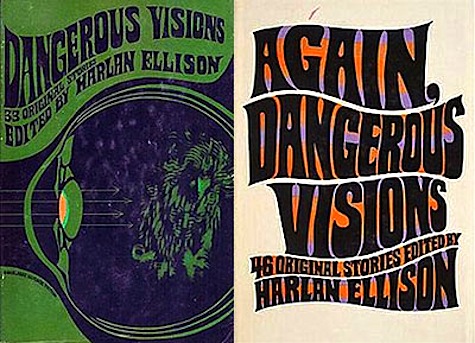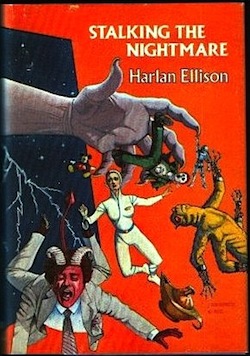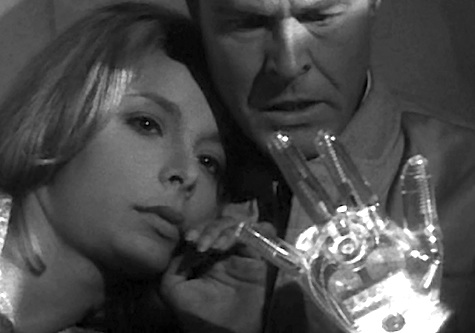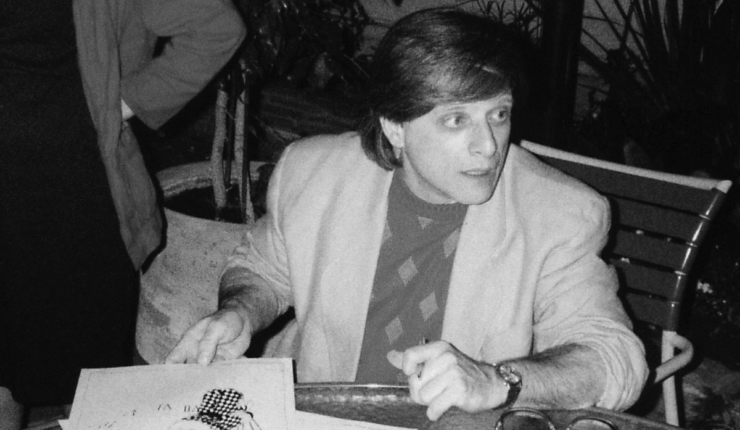Today is the 78th birthday of speculative fiction writer Harlan Ellison. Known to even the most casual fans of the field of SF, Ellison is a giant figure, with a reputation for being as original, eccentric, and explosive as his writing. With Hugos, Nebulas, Screenwriters Guild Awards and so forth coming out of his ears, Ellison has racked up more accomplishments than most writers in any field will ever come close to achieving.
But maybe you’re a newcomer to the world of SF and you’re not quite sure where Harlan Ellison fits in. Perhaps you’re more familiar with the reputation than the work. How should you approach the oeuvre of Ellison without being overwhelmed? Today, on his birthday, I’d like to give Ellison newcomers three different ways to approach his work, which will instantly help you to understand his importance, and probably turn you into a fan.
Ellison the Editor

Because Ellison’s big personality is such a huge part of his work, one of the easiest ways to understand his voice is check out his editorial work in both Dangerous Visions and Again, Dangerous Visions. Briefly, the original Dangerous Visions was conceived as a massive anthology of short fiction that tested the boundaries of what fiction writers could do not just in the genre of SF, but really, in any genre. The second volume continued this trend, and both books contain some of the best work from writers like Ursula K. Le Guin and Philip K. Dick to Robert Bloch and Kurt Vonnegut. But the beauty in both books is the lengthy introductions Ellison gives each author.
He describes in great detail his relationship with each of the authors and how the story found its way into the anthology. These essays are sometimes more memorable than the stories they introduce and elevate the notion of an informal introduction into high art. You get the sense from these pieces that Harlan Ellison would be the best conceivable person to give you a toast, ever.
 Ellison the Short Story Writer
Ellison the Short Story Writer
The majority of Ellison’s printed work is in the form of short fiction, and it is here where the uninitiated reader might be a little overwhelmed. Should one purchase The Complete Ellison? Just which collection contains his best or most famous stories? The simple answer is the “greatest hits” collection Troublemakers. Published around the turn of the century, this book is the perfect introduction to Ellison, one which contains some of his absolute best stories. The story of a telepath with the ability to start fires, “Deeper than Darkness” is in here. The heartbreaking story a boy who never ages, “Jeffty is Five” is included. And probably most importantly, the enduringly famous “‘Repent, Harlequin!’ Said the Ticktockman.”
But if you want to mix it up a little bit, and maybe want some non-fiction mixed in with fiction, try to find a copy of the killer collection Stalking the Nightmare. This one features a forward from none other than Stephen King, and contains some of the lesser known—though extremely chilling—tales Ellison has to offer. In Stalking the Nightmare, Ellison the fiction writer and Ellison the essayist coalesce into a highly readable monster.
Finally, if you want to be truly terrified (and pick a book somewhere into between the greatest hits collection of Troublemakers and the more obscure Stalking the Nightmare), grab a copy of the short story collection I Have No Mouth And I Must Scream. The title story alone is worth it.
Ellison the Screenwriter

There’s a pretty good chance even a casual science fiction fan is aware Harlan Ellison wrote Star Trek‘s “The City on the Edge of Forever,” which is widely (and correctly) considered to be the best episode of the classic series. But Ellison’s other forays into screenwriting are just as relevant, interesting and illuminating as to what this author is capable of. Other than Star Trek, perhaps the best way to appreciate this aspect of Ellison’s work is watch the episode of The Outer Limits titled “Demon with a Glass Hand.” If you’re doing this while also reading some of Ellison’s short fiction (specifically “Deeper than Darkness”), you’ll notice references to an alien race know as the Kyben. These are bad guys the human race as been at war with for a while, and the man with the robot hand carries a terrible secret as to the eventual fate of humanity as a result of this conflict. Classic Outer Limits was often more hard science fiction than The Twilight Zone, and “Demon with a Glass Hand” is still one of the best examples of that tendency.
Sometimes Ellison’s un-filmed science fiction projects are just an interesting as the ones that made it to the screen. The greatest example of this is his collaboration with Isaac Asimov to create a film version of I, Robot. Though never actually turned into a movie, Asimov and Ellison did release the entire screenplay in book format complete with awesome concept art by Mark Zug. The characters are mostly Asimov’s but the writing is definitely Ellison. He manages to weave in all the best short stories from I, Robot into a cohesive and touching narrative that is absent from the patchwork of the source material. Doing robot stories in way which presents both classic Asimov robot-tropes AND fast-paced, razor sharp dialogue is very difficult: if you read the I, Robot screenplay, it will all seem possible.
This is by no means a comprehensive list, just simply a few portals one can crack open to enter into the dimension of Ellison. He’s the reason why a lot of us got into this field. Thanks, Harlan, and happy birthday!
Ryan Britt is the Staff Writer for Tor.com. He will edit Dangerous Visions: Reloaded if Harlan lets him.











Good recommendations. Happy birthday, indeed!
I think Stalking the Nightmare was the first one I bought and read, way back when. No wonder I got hooked!
I feel kinda bad about it, but I laughed out loud at “Ellison is a giant figure”.
I love, love, love “I Have No Mouth”, but I must be a plebeian (in the “vulgar or common” definition) because I’ve never understood what’s so great about “Repent, Harlequin”. I just leaves me cold.
hypnoskills, That’s funny, I would pick the opposite. “I Have No Mouth…” just creeps me out, while I find “Repent, Harlequin…” very compelling. Different strokes for different folks, as they say!
Maybe Shatterday contains my favorite stories. Just brutal, heartwrenching stuff… and then there’s “How’s the Night Life on Cissalda?” which is a hilarious space alien romp, literally.
I find Harlan Ellison to be slightly like George Carlin except… you know, not funny. And annoying. He just seems grumpy 24/7 and in addition to having a self-righteous quality to this anger, he also has a kind of double-standard about it. Yes, it’s disheartening when people act like “jerks!” or “douchebags!” all the time, but then again, when HE does it (not all the time, but still), it’s “provocative” and/or “edgy”.
I’m really glad for this post, since I’ve repeatedly been trying to get into/appreciate Ellison’s work for a while now. Even watched the documentary. But mouth or no mouth, he just seems to scream all the time. For money, mostly. And how stupid everybody else is.
It’s kind of exhausting. And boring, too.
Probably should buy & read “Dangerous Visions” and leave it at that.
I encountered Ellison’s work rather a long time ago. And it was several decades ago when I read “I Have No Mouth”. I read it once, and will never read it again. I don’t need to. That story was the scariest piece of fiction I have ever encountered, in any medium. To this day, I only need to hear or read the name of the story, and I can remember that reaction. It may be that no one else has this connection to that story. Still, that was when I knew that Ellison is a great writer. I was changed by reading that story.
For the most accessible entry point, I’d nominate “Love Ain’t Nothing But Sex Misspelled”.
A shame that screenplay for I, Robot never made it to the screen. It would have been far superior, I’m sure, to the dreck that was the Will Smith film. I’ll have to read it.
@9
Of the two brief times I’ve spoken with Ellison, once was the year that I, Robot movie actually came out. He quietly advised me not to see it. Foolishly, I didn’t heed his warning!
The Will Smith I, Robot is awful, awful, awful. But made all the worse by how awesome the Ellison screenplay truly is. Yes, read it! :-)